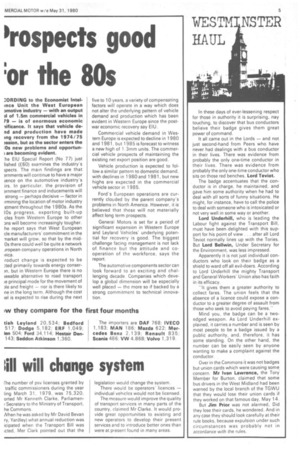liii will change system [ - he number of psv licenses granted
Page 7

If you've noticed an error in this article please click here to report it so we can fix it.
by traffic commissioners during the year ling March 31, 1979, was 75,320, orted Mr Kenneth Clarke, Parliamen
■ Secretary to the Ministry of Transport, he Commons.
Nhen he was asked by Mr David Bevan ry, Yardley) what annual reduction was icipated when the Transport Bill was icted, Mer Clark pointed out that the legislation would change the system.
There would be operators' licences — individual vehicles would not be licensed.
The measure would improve the quality of transport services in many parts of the country, claimed Mr Clarke. It would provide great opportunities to existing and new operators to develop their present services and to introduce better ones than were at present found in many areas. In these days of ever-lessening respect for those in authority it is surprising, nay touching, to discover that bus conductors believe their badge gives them great power of command.
It all came out in the Lords — and not just second-hand from Peers who have never had dealings with a bus conductor in their lives. There was evidence from probably the only one-time conductor in their lives. There was evidence from probably the only one-time conductor who sits on those red benches, Lord Teviot.
The badge accentuates that the conductor is in charge, he maintained, and gave him some authority when he had to deal with all sorts of funny situations. He might, for instance, have to call the police to deal with someone who is intoxicated or not very well in some way or another.
Lord Underhill, who is leading the Labour fight against the Transport Bill, must have been-delighted with this support for his point of view . . . after all Lord Teviot normally lines up with the Tories. But Lord Bellwin, Under Secretary for the Environment, was less impressed.
Apparently it is not just individual conductors who look on their badge as a shield to ward off all evil-doers. According to Lord Underhill the mighty Transport and General Workers' Union also has faith in its efficacy.
"It gives them a greater authority to collect fares. The union feels that the absence of a licence could expose a conductor to a greater degree of assault from those who seek to avoid paying fares.
Mind you, the badge can be a twoedged weapon. As Lord Underhill explained, it carries a number and is seen by most people to be a badge issued by a public authority, and, therefore, it has some standing. On the other hand, the number can be easily seen by anyone wanting to make a complaint against the conductor.
Over in the Commons it was not badges but union cards which were causing some concern. Mr Ivan Lawrence, the Tory Member for Burton, claimed that some bus drivers in the West Midland had been warned by the local branch of the TGWU that they would lose their union cards if they worked on that famous day, May 14.
But Jim Prior was not alarmed, Did they lose their cards, he wondered. And in any case they should look carefully at their rule books, because expulsion under such circumstances was probably not in accordance with the rules.




























































































































